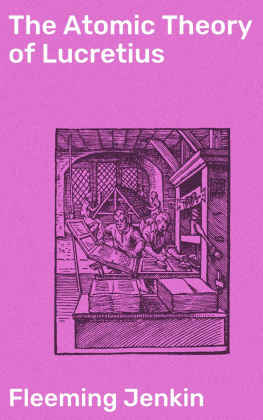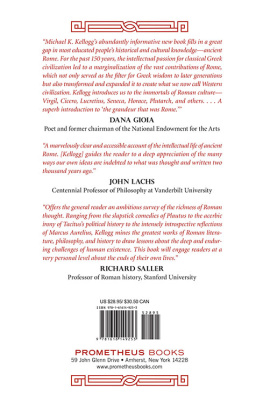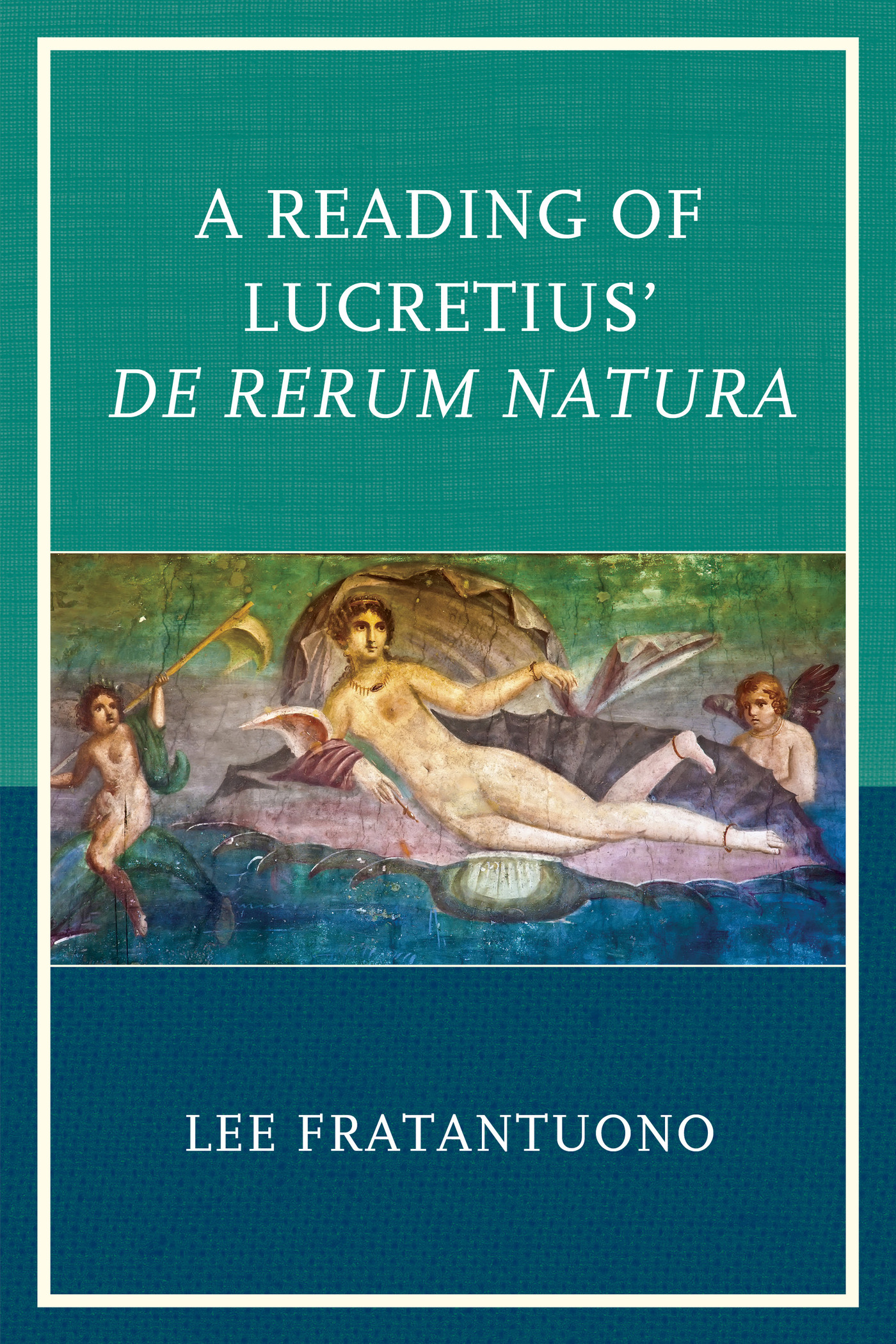A Reading of Lucretius
De Rerum Natura
A Reading of Lucretius
De Rerum Natura
Lee Fratantuono
LEXINGTON BOOKS
Lanham Boulder New York London
Published by Lexington Books
An imprint of The Rowman & Littlefield Publishing Group, Inc.
4501 Forbes Boulevard, Suite 200, Lanham, Maryland 20706
www.rowman.com
Unit A, Whitacre Mews, 26-34 Stannary Street, London SE11 4AB
Copyright 2015 by Lexington Books
All rights reserved. No part of this book may be reproduced in any form or by any electronic or mechanical means, including information storage and retrieval systems, without written permission from the publisher, except by a reviewer who may quote passages in a review.
British Library Cataloguing in Publication Information Available
Library of Congress Cataloging-in-Publication Data
Fratantuono, Lee, 1973- author.
A reading of Lucretius' De rerum natura / Lee Fratantuono.
pages cm.
Includes bibliographical references and index.
ISBN 978-1-4985-1154-4 (cloth) -- ISBN 978-1-4985-1155-1 (electronic)
1. Lucretius Carus, Titus. De rerum natura. I. Title.
PA6484.F74 2015
187--dc23
2015008167
 TM The paper used in this publication meets the minimum requirements of American National Standard for Information Sciences Permanence of Paper for Printed Library Materials, ANSI/NISO Z39.48-1992.
TM The paper used in this publication meets the minimum requirements of American National Standard for Information Sciences Permanence of Paper for Printed Library Materials, ANSI/NISO Z39.48-1992.
Printed in the United States of America
For J. D. B. Hamilton,
with deep respect and abiding affection
Preface
I first read selections of Lucretius mystifying and enigmatic epic of the universe in the spring of 1993, in a wonderfully congenial undergraduate seminar offered by the late Professor Gerard Lavery. Our text was the 1942 edition of Leonard and Smithand our knowledge of such figures as Epicurus and Ennius minimal. But our sense of wonder at the strange and haunting loveliness of the poet of the nature of things was profound.
My term paper for that course was on the influence of Lucretius on Lucan, a paper that today is an embarrassment to revisit. I was fascinated that spring by the idea that Lucretius poem was the first surviving integral epic of ancient Romeand I was intrigued by the idea that later epic poets surely found both inspiration and challenge in the elegantly beautiful, disturbingly obscure hexameters of the Aeneadum genetrix. And the memory of many a serene night in Loyola Hall with the poet of the atoms and void is fresh and pleasant.
A complete reading of the epic came only in the summer of 1996and, in the fall of 2007, the first chance to teach my own undergraduate class on the poet. By then, work on Virgil occupied most of my time, and I was reminded every day of the pervasive influence of Lucretius on later Latin epic. And so in some sense the idea was always present that I would return to Lucretius, to engage in a closer study of his eerie verses.
A Reading of Lucretius De Rerum Natura is another idiosyncratic introduction to a difficult epic. Like its predecessors, it proceeds verse by verse through the poem, offering a commentary or explication de texte. It assumes that epics are meant to be read from start to finish, without excerpting and abridgment. Lucretius has not been the subject of much in the way of introductory treatments and surveys (indeed in some ways certain aspects of his work seem to mitigate against the attempt); in this regard I have aimed at producing something on a scale more akin to Massons fin de sicle work than the briefer, exemplary volumes of Monica Gale and John Godwin. As with my previous introductions to Latin epics, I have endeavored to make the book appealing to a wide and diverse range of audiences. Still, an already long book would have been even longer had all the Latin been given a translation. There are outstanding English versions of Lucretius available: those of Melville, Smith, and Stallings (in alphabetic, not judgmental order) would constitute my triad of recommended options. Kany-Turpin has a wonderful edition with French verse translation and brief, good notes published by Aubier/Flammarion.
Works such as this inevitably have a good deal of paraphrase, a feature that some find useful for grounding oneself in an argument, and which others find less than pleasing. In a change from its predecessors, A Reading of Lucretius De Rerum Natura offers brief titles and divisions through the chapters to make the progress of the argument through the long sections easier to follow (and rather in the tradition of the Lucretian manuscript capitula). The present volume does not presuppose knowledge of its three predecessors, but those familiar with the arguments of the Madness volumes will find frequent connections (especially in the notes) to theories and speculations raised there, and in several respects this book can serve as introduction to that trilogy.
The Latin epic with which Lucretius was most in competition was Ennius Annales, a work that has sadly not been treated well by the ravages of time. That poem was what we might call a narrative epic, a story that proceeded from a starting point in time and advanced through the course of the years. In the reading of Lucretius offered in these pages, the poet of the rerum natura offers both didactic exposition and narrative commentary on Rome and the world; his poem is in that sense greater than Ennius because of its broader scope and more comprehensive commentary: an omnibus epic for the republic that is now the de facto master of the known world. I have attempted to show how the more stereotypically scientific passages fit together with the more conventionally poetic sequences to produce an epic achievement that displays unity and organization, narrative thrust and progress, and careful attention to the balanced presentation of themes and analysis thereof. Lucretius is herein taken seriously as an epic master of the first order, as a poetic composer who justly merits the garland crown of which he singsand certainly not the verdict of rebarbative that was once applied to his work.
And so this book is not, I should make clear, a primer in Greek philosophy. Nor is it a detailed account of the debt owed by this or that later poet to Lucretius (though such echoes and allusions pepper its pages). Indeed, the influence of Lucretius on each of his successors would merit a monograph apiece. One will not find a treatment of how Lucretius is or is not a good Epicurean, or the relationship of the poet to his Epicurean contemporaries. The present study is a reading of the poem by someone who has been haunted by its verses for over twenty years, and who has read the works that succeeded it in the Latin epic tradition many times over. If it has a goal, it is to instill a deeper love for Lucretius in his readers, and along the way to raise questions and to offer avenues for further inquiry. But while it is not an introduction to the thought of Epicurus, or of his contemporaries and philosophical predecessors, it is to be hoped that those who approach Lucretius from the discipline of philosophy will find material of interest in these pages, and a commentary on a great poet that is of value to those whose time is more often spent with prose than verse.
And, like any work on an ancient author, there is an acute awareness throughout of the fluid state of scholarship on the text of the poet; Lucretius epic presents significant difficulties of a textual nature, and the notes reflect the large number of places where the reading is uncertain, and where there is a question of a lacuna or other more or less serious textual crux that challenges ingenuity and invites sober reflection. The pages of this book make liberal use of subjunctives and cautionary adverbsand also of the at least occasionally valuable tool that is speculation. Lucretius more than once enjoins his reader not to be surprised or in a state of marvel about this or that terrestrial or celestial phenomenonand yet never have I experienced a greater sense of
Next page












 TM The paper used in this publication meets the minimum requirements of American National Standard for Information Sciences Permanence of Paper for Printed Library Materials, ANSI/NISO Z39.48-1992.
TM The paper used in this publication meets the minimum requirements of American National Standard for Information Sciences Permanence of Paper for Printed Library Materials, ANSI/NISO Z39.48-1992.